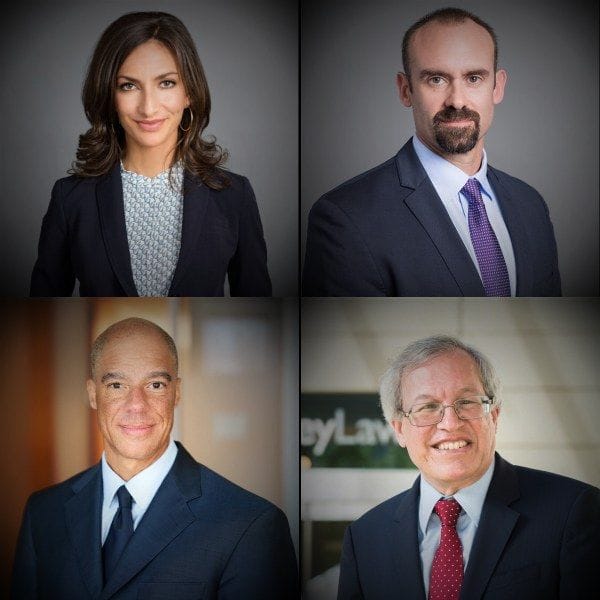LA Focus: “Convictions Cannot Stand” State Lawyers in their Appeal of the Mark Ridley-Thomas Case

January 26, 2024
“What should have begun and ended as an internal investigation at USC resulted in a prosecution untethered to federal precedent.” - Attorney Alyssa Bell
“Dr. Mark Ridley-Thomas is not guilty of either federal-programs bribery or honest services fraud. The government’s prosecution of Dr. Ridley-Thomas involved none of the hallmarks of traditional bribery: no private enrichment, no intent to be influenced, and no deception material to the would-be victims. His convictions cannot stand,” stated Paul Watford, on behalf of the legal team representing the former L.A. City Councilmember in filing its appeal of Ridley-Thomas’ March 30, 2023 conviction with the Ninth Circuit Court of Appeals.
The appeal details how the U.S. Attorney created a novel theory of what constitutes bribery and honest services fraud. Additionally, the prosecution used two preemptory strikes to eliminate all Black women from the jury. Dr. Ridley-Thomas’ legal team, led by former Appellate Court Judge Paul Watford, now a partner at Wilson Sonsini Goodrich & Rosati, UC Berkeley School of Law Dean Erwin Chemerinsky, and Alyssa Bell and Michael Schafler, partners with Cohen Williams LLP, contends the Ninth Circuit Court of Appeals must either reverse the convictions or grant a new trial based on the arguments made in the brief.
The legal brief states that Federal District Court Judge Dale S. Fischer misapplied the law, erred in instructing the jury, and/or erred in rulings during jury selection, and details the many ways in which those errors inhibited Dr. Ridley-Thomas’ ability to obtain a fair trial.
Further, that the U.S. Attorney used a bribery theory that was not only incorrect but also chills legitimate policy making. Dr. Ridley-Thomas’s prosecution rests on the theory that Dean Flynn’s assistance in funding PRPI (Policy Research & Practice Initiative) was a “thing of value” that serves as the quid in a quid pro quo bribery scheme. But Flynn’s assistance cannot be a quid as a matter of law because it did not personally enrich Dr. Ridley-Thomas. The appeal also challenges the honest services fraud counts on the ground that the government failed to prove that Dr. Ridley-Thomas engaged in deception that was material to his constituents. At trial, the government argued that Ridley-Thomas deceived USC, but fraud on the public cannot be proven by means of deceptive material to USC.
The legal team maintains that the government’s theory is not only unprecedented but also risks turning ordinary exchanges critical to representative government – from ribbon cutting ceremonies to honorary degrees – into grounds for federal prosecution and unless overturned, would have a chilling impact on routine government operation.
“The United States Supreme Court has greatly limited the use of the federal fraud statutes. The verdict in this case is clearly inconsistent with these precedents,” stated Erwin Chemerinsky, dean, UC Berkeley School of Law. “This decision, unless overturned, threatens to give enormous power to federal prosecutors over local governments across the country.”
Additionally, the government’s case rested on the theory that Ridley-Thomas took a “thing of value” and the so-called “funneling” of money to the non-profit was the same as taking a cash bribe. Under the government’s theory, USC School of Social Work Dean Marilyn Flynn’s assistance was valuable to Ridley-Thomas because it avoided the “nepotistic optics” of a direct donation to his son’s non-profit (PRPI), and thereby protected Dr. Ridley-Thomas public image and enhanced his future electability. The U.S. Attorney’s office referred to this act as a “thing of value.” But lawyers maintain that in Dr. Ridley-Thomas’ case, a “thing of value” can be no broader than property, not the right to control information.
Yet another area of contention was the government’s use of an unprecedented bribery theory that Attorney Alyssa Bell says chills legitimate policymaking.
“A hallmark of traditional bribery is private enrichment at the victim’s expense,” Bell states. “In this case, there was no private enrichment. The so-called ‘secret funneling’ is not a thing of value.
“What should have begun and ended as an internal investigation at USC resulted in a prosecution untethered to federal precedent,” added Bell. “Mark Ridley-Thomas did not line his own pockets. Quite the opposite – he donated $100,000 of his own ballot committee funds so that PRPI could hire a fulltime staff member and begin its work of polling Black Angelenos about their legislative priorities. This is the first prosecution ever to proceed on such a theory.”
Finally, Dr. Ridley-Thomas’ legal team argues that, during jury selection, the government used two of its pre-emptory challenges in a discriminatory manner to purposefully exclude two Black women from the jury – a Batson challenge. As stated in Batson v Kentucky, “Purposeful racial discrimination in selection of the jury panel (venire) violates a defendant’s right to equal protection because it denies him the protection that a trial by jury is intended to secure.” Black women face discrimination on two major counts – both race and gender – and their lives are uniquely marked by this combination. Their exclusion deprives the jury of a perspective of human events that may have unsuspected importance in any case that may be presented.
“The L.A. County Telehealth contract focused primarily on low-income, minority children,” added Schafler. “The prosecution’s use of race and gender as proxies for juror competence and reliability violated Ridley-Thomas’s right to a fair trial.”
“The Ninth Circuit has yet to recognize an intersectional race and gender class for Batson purposes. It’s beyond time that they do so,” concluded Schafler.
This article was originally posted to LA Focus

